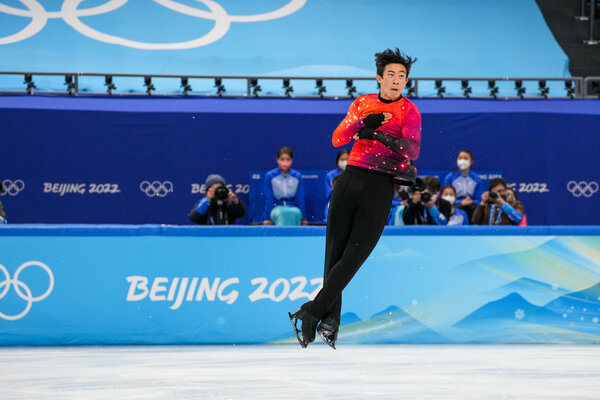
BEIJING — After landing his final jump on Thursday, Nathan Chen said goodbye to his nerves and let himself have fun. Four long years after his crushing fifth-place finish at the 2018 Olympics, he had earned that right.
As an Elton John medley played during his free skate Thursday in the men’s singles figure skating event at the Beijing Games, Chen danced across the ice to a “Rocket Man” beat that turned from soulful to hip-hop. Nearing the end of his performance, he also realized that, yes, it was probably time to smile.
That was when Chen, a skater known for showing little emotion, let loose. He knew his performance had been good enough — finally — to win an Olympic gold medal.
“I never thought I would actually be able to make this happen,” Chen said. “It’s hard. It’s always been a dream, of course. It’s a pretty daunting mountain.”
Chen, 22, made it happen with five jet-fueled quadruple jumps and a series of gyroscope-like spins that turned his bright top into a tangerine blur. The crowd watched him, on edge.
As the final skater to perform, and with the gold in his reach at last, Chen nearly demanded that the spectators hold their breath. After each of his jumps, the crowd rewarded him with cheers.
He won the gold medal in breathtaking fashion, finishing first in the short program on Tuesday and again in the free skate on Thursday to end up with a total of 332.60 points, leagues ahead of the silver medalist Yuma Kagiyama of Japan (310.05) and another Japanese skater, Shoma Uno, who was third with 293.0.
Kagiyama, 18, and Uno, 24, both had a high degree of difficulty in their routines, but each made mistakes on his jumps, and against a skater at the peak of his talents like Chen, any bobble was one too many.
x
x
x
x
x
Bigger mistakes kept Yuzuru Hanyu of Japan, who was fourth, from winning the gold medal for the third Olympics in a row. In the short program, Hanyu aborted his first jump, later claiming he had hit a hole in the ice, and couldn’t make up the lost points in the free program. He faltered twice, including on his bold attempt to execute quadruple axel, a four-and-a-half revolution jump never landed in competition. He came close to nailing it.
“No matter how hard, no matter how unimaginable, I want to push a little bit more for those who have expectations in me,” Hanyu said.
Uno, who finished second to Hanyu at the 2018 Games, said, “Nobody can expect perfect jumps, except Nathan.”
Chen’s free skate was nearly impeccable, and it showed why he is a three-time world champion considered the best skater in the world. He has lost only once since the 2018 worlds. That was the year he was at his lowest, after he came into the 2018 Pyeongchang Olympics hyped as the next great American champion but failed to live up to those expectations, or his own.
Stumbling in the short program, he was out of medal contention even before the free skate. But he rose to fifth place from 17th with a spectacular free skate that he said changed his perspective on the sport, and on life. It wasn’t the end of the world, he concluded, when he didn’t win Olympic gold at 18. It was, in a way, a new beginning.
Chen studied at Yale for two years while continuing to compete on the international stage, expanding his horizons beyond the world of skating he had known since he started competing as a boy, the youngest of five Chen siblings.
Back then, his life had revolved around the sport. When he was about 11, he began training under the coach Rafael Arutyunyan in California, first traveling to sessions there from his home in Salt Lake City by car with his mother. The Chens would sleep in their car on those trips, he said, because a hotel room was an unmanageable expense.
Arutyunyan quickly saw promise in the young Chen, but he knew that the boy’s parents — Chinese immigrants who had arrived in the United States in the late 1980s — did not have the resources to finance an expensive elite skating career. So when Nathan’s mother, Hetty Wang, would scrape up money to pay Arutyunyan with cash, the coach would sometimes hand it right back to Nathan.
The coach knew Chen had the makings of a champion, and the two got along because, as Arutyunyan said on Thursday, Chen liked that he was a straightforward, not-so-cuddly coach.
“I’m honest, and he likes to have somebody honest,” Arutyunyan said. “He doesn’t like, ‘Good job!’” he added, spitting out the phrase as if it were a bitter taste in his mouth. From the hard-shell coach, praise like that for Chen was a long time coming.
When Chen won the gold medal, Arutrunyan grew teary. He said he had known when he arrived in Beijing that Chen would win, and when he did, the coach turned to his pupil and told him, with all seriousness, “Good job.”
Then, he added, “Now, go thank your mother on TV.”
In reflecting on the support system that helped him reach the top of the sport, Chen acknowledged his family and friends, including Mariah Bell, the United States national champion who is skating next week in Beijing, and his training partner, Michal Brezina of the Czech Republic, who was by Chen’s side in California as a friend and an adviser throughout the pandemic.
It was Brezina, a four-time Olympian, who hosted skater-only game nights at his house, competitions that Chen would always win. And it was Brezina who talked to Chen about seeing a sports psychologist last year. Chen said that mental health support had made a big difference in his performance, helping him stay grounded before and during the Games.
“Heading into the season, I was like, you know, I’ve never really tried it and I don’t really want to leave a stone unturned, so I was just going to give it a try to see how it goes,” Chen said.
Chen’s psychologist talked to him regularly as the competition grew closer and another Olympic short program loomed. Four years ago, Chen’s disastrous performance in that program had cost him any chance at a medal. This year, the short program — and how he finally conquered it — set him up for the gold.
But these Olympics also saw a new Nathan Chen, now all grown up, wiser and more confident: a Nathan Chen OK with removing his blinders, with cherishing the small moments as well as his big chance.
Turning inward in Beijing, Chen said he stayed off social media, played his electric guitar, and texted and talked with his family every day, feeling bolstered by their resounding, soothing pep talks. On the way to the Olympic rink, he took in the sights, making sure to look at the Beijing Zoo, where his mother, who is from the Chinese capital, had brought him when he was 10.
At his final practice on Thursday in the Olympic rink, hours before his gold medal skate, Chen stood alone for a while. He scanned the arena and immersed himself in the Olympic rings painted under the ice, in the stands and on the walls. And he reminded himself how lucky he was to be able to chase a gold medal.
How many people actually win one? Not many. Now, he is only the seventh American man to win the Olympic singles title, and just the second since 1988.
“This still hasn’t sunk in,” Chen said.




